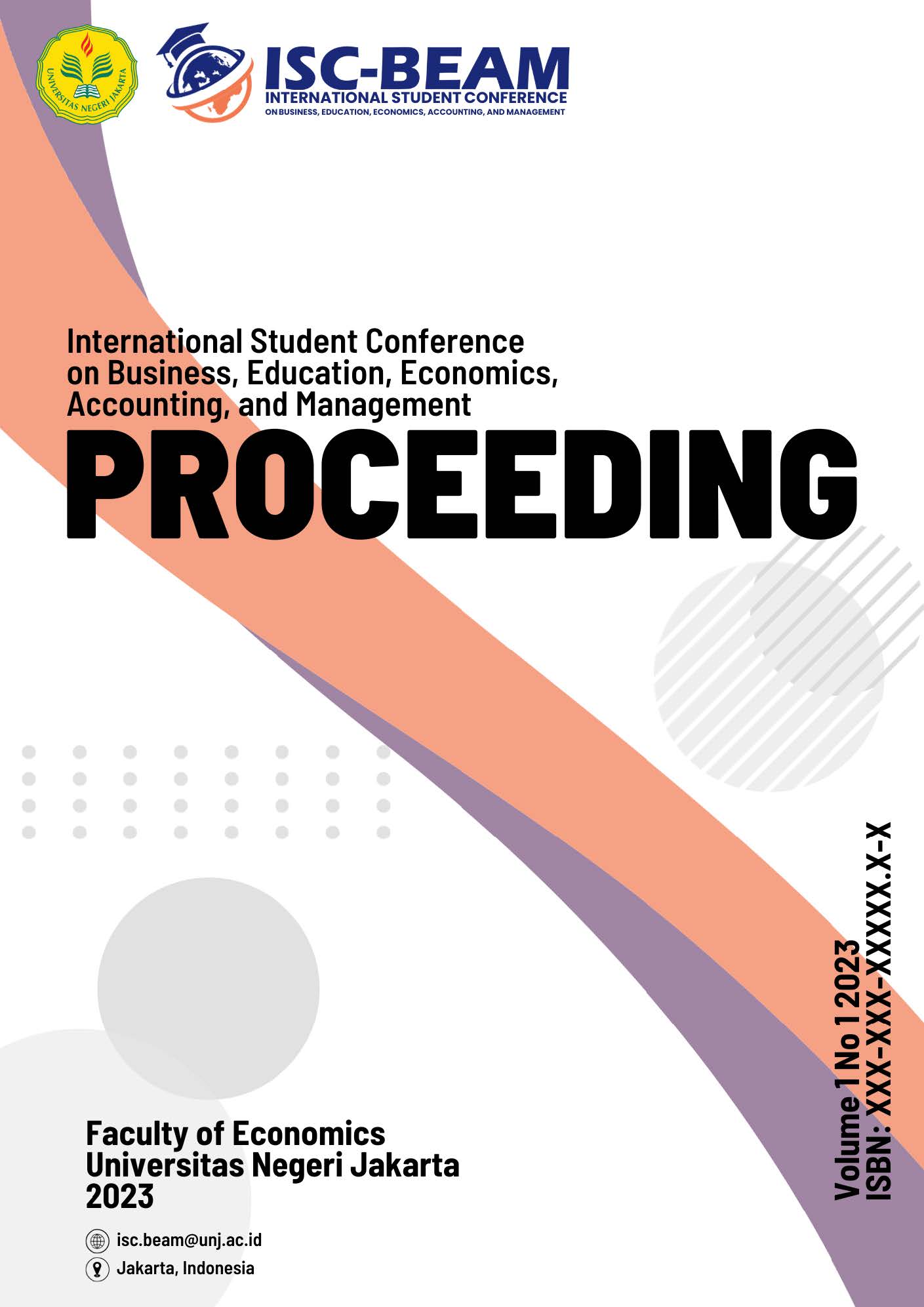PT Gojek Indonesia: Maintaining Corporate Sustainability with Innovation and Customer Perception
DOI:
https://doi.org/10.21009/ISC-BEAM.011.58Keywords:
Innovation Management, Technological Innovation, Customer Satisfaction, Customer Loyalty, Organizational Performance, Corporate SustainabilityAbstract
This research has a special problem in considering how much influence innovation management has on technological innovation, customer satisfaction on customer loyalty, as well as the impact of technological innovation and customer loyalty on corporate performance and corporate sustainability. The aim is that PT. Go-Jek Indonesia can consider things that can maintain corporate sustainability in a business context. This research uses quantitative research methods as its research method by distributing questionnaires to Go-Jek users who will later provide their views on PT. Gojek Indonesia. Researchers found that there is a close relationship between all variables and corporate sustainability directly and indirectly. This illustrates theoretically that maintaining innovation and customer perspective with good intentions will have an impact on the corporate's sustainability in the long term or the sustainability of PT. Gojek Indonesia. The research concludes that technological innovation, innovation management, customer satisfaction, customer loyalty, and organizational performance all
significantly and positively impact PT. Gojek Indonesia’s sustainability. The findings emphasize the need for PT. Gojek Indonesia to prioritize these variables to ensure the corporate's long-term sustainability and success.
References
Abdullah, N. N., Prabhu, M., & Othman, M. B. (2022). Analysing driving factors of customer satisfaction among telecommunication service providers in Kurdistan region. International Journal of Engineering Business Management, 14, 18479790221111436.
Alfred, B. O., Kana, A. F. D., & Aliyu, S. (2022). Predicting the Corrosion Rate of Oil and Gas Pipelines Using Neural Network. University of Ibadan Journal of Science and Logics in ICT Research, 8(2), 1-10.
Aras, G., Tezcan, N., & Furtuna, O. K. (2019). Extended corporate sustainability disclosure: Turkish banking sector. In Corporate Social Responsibility, Ethics and Sustainable Prosperity (pp. 417-440).
Chiffi, D., Moroni, S., & Zanetti, L. (2022). Types of Technological Innovation in the Face of Uncertainty. Philosophy & Technology, 35(4), 94.
Firman, F., Anra, Y., Pratama, R., & Wulan Tersta, F. (2021). Factors Affecting Intentions and Behavior of Plagiarism Among Students in Jambi University: Testing the Data Quality for Validity and Reliability. SPEKTRUM Jurnal Pendidikan Luar Sekolah (PLS), 9(4), 462-478.
Futane, A. G., & Tech, B.(2021). 24. Sampling Technique in Research Methodology. Contemporary Multi-disciplinary Research Trend, 228.
Hair Jr, J. F., Hult, G. T. M., Ringle, C. M., Sarstedt, M., Danks, N. P., & Ray, S. (2021). Partial least squares structural equation modeling (PLS-SEM) using R: A workbook (p. 197). Springer Nature.
Hakim, M. F., Anhar, M., & Sampurna, D. S. (2021). The Influence of Work Motivation, Work Discipline and Work Environment on Job Satisfaction. Indonesian Journal of Business, Accounting and Management, 4(01), 20-27.
Ibinabo, W. A., Zeb-Obipi, I., & Samuel, J. S.(2020). Cultural Diversity and Organizational Performance of 3 Star Hotels in South-South Nigeria.
Islamiati, N., & Rahmawati, Y. (2023). Analisis Hubungan Self-Efficacy Dengan Prestasi Belajar Mahasiswa di STKIP Al Amin Dompu. Jurnal LENTERA: Jurnal Studi Pendidikan, 5(1), 33-42.
Kaban, Z. U., Kindangen, P., & Tumewu, F. J. (2021). The Influence of Differentiation Strategy towards Buying Decision on Samsung Galaxy Smartphone with Consumer Perceived Value as a Mediating Role in Manado City. Jurnal EMBA: Jurnal Riset Ekonomi, Manajemen, Bisnis dan Akuntansi, 9(2).
Kamphuis, D. (2022). The Possibilities Of Employee Shared Ownership Determining The Impact Of Employee Shared Ownership on The Relationship Between Home-based Work and Organizational Performance.
ÖZÜTLER, H. Ş., & SHAGHASY, M. M. (2022). The Impact of Organizational Learning Culture on Organizational Performance: Case Study for Afghanistan. Yaşar Üniversitesi E-Dergisi, 17(65), 95-116.
Prasetyawan, I. R., & Silitonga, E. S. (2020). The Effect of Leadership and Management Innovation on Company Performance in Sankita Hotels with Organizational trust as a Mediation Variables.
Roscoe, S., Subramanian, N., Prifti, R., & Wu, L. (2020). Stakeholder engagement in a sustainable sales and operations planning process. Business Strategy and the Environment, 29(8), 3526-3541.
Rosén, E., & Kozic, S. (2023). Assessing the Viability of Random Indexing in Song Recommender Systems.Saputra, A., & Tentama, F. (2020). Construction of the subjective well-being scale.International Journal of Scientific and Technology Research, 9(2), 38-42.
Siahaan, R. A. E., Rakasiwi, R., & Silalahi, M. M. R. (2022). The Effect of Using Collaborative Strategic in Reading Narrative Text at SMA Advent 2 Medan. INFOKUM, 10(03), 104-106.
Subagiyo, R., Mutafarida, B., Asiyah, B. N., Bachtiar, J., & Fauzan, F. (2022). Islamic Bank Customer Loyalty: An Analysis of Griffin's Theory and Relevant Research. Ulul Albab, 23(1), 42.
Tang, D., Yan, J., Sheng, X., Hai, Y., & Boamah, V. (2023). Research on Green Finance, Technological Innovation, and Industrial Structure Upgrading in the Yangtze River Economic Belt. Sustainability, 15(18), 13831.
Vevere, V., Shina, I., & Ganina, S. (2022). Corporate Social Responsibility as a Factor Promoting Customer Loyalty in the Latvian Retail Sector. European Integration Studies, (16), 135-149.
Wardana, R. K., Masyita, D., & Paramita, V. S. (2019). The effect of land value factors in determining tax object sales value (NJOP) and analysis of assessment sales ratio: case study in Malang City, Indonesia. International Journal of Sustainable Real Estate and Construction Economics, 1(3), 273-286.
Weiyu, Z., Othman, A., & Guli, T. (2022). Role of technological acquisition and R&D expenditure in innovative investment. Frontiers in Psychology, 13, 855295.
Yu, A. C., & Eng, J. (2020). One algorithm may not fit all: how selection bias affects machine learning performance. Radiographics, 40(7), 1932-1937.






